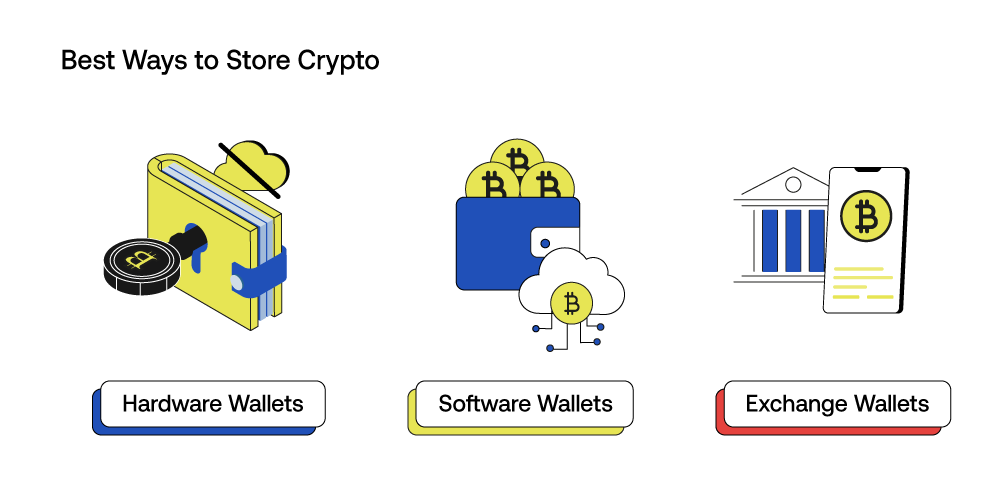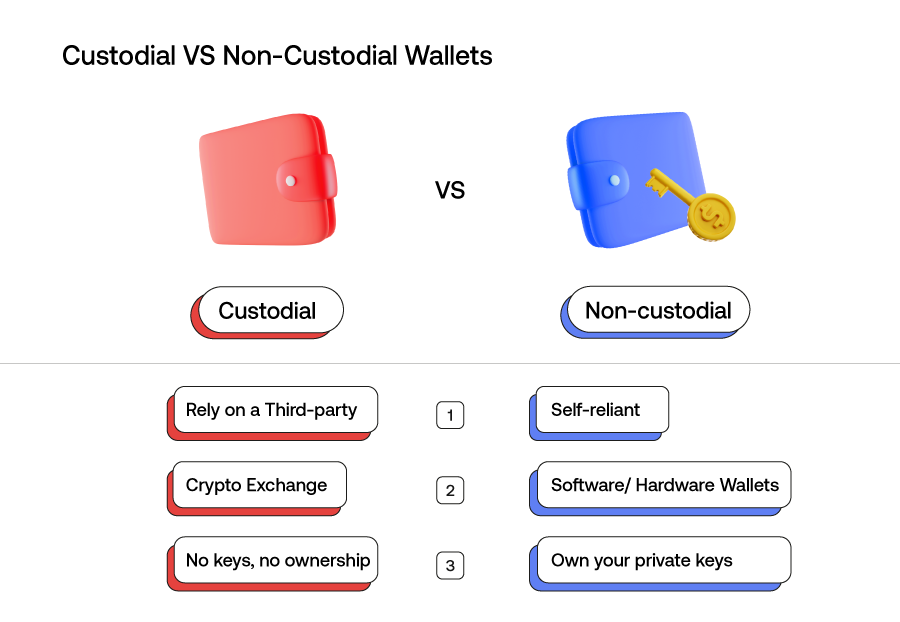
As dedicated crypto adventurers navigate this relatively new web3 space, one essential aspect is understanding how to store your assets securely. This is a crucial topic as it concerns the safety of your digital investments. From digital wallets to hardware options there are plenty of options and pros and cons for each.
Knowing where to start is confusing enough, how do you actually make a decision? Read on for the necessary tools and a clear understanding of how best to protect your virtual wealth!
Table of Contents
- Store Your Cryptocurrency Safely and Correctly
Best Ways to Store Crypto
You need a crypto wallet to store crypto, but there are several types to pick from.

Hardware Wallets
A hardware wallet is a physical device designed to secure crypto coins and your private keys, the “passwords” for your crypto. This type of wallet keeps your keys completely offline and out of hackers’ reach. These devices usually come with a backup phrase (recovery phrase) to help you restore your crypto if your wallet is ever lost.
Key Features of Hardware Wallets:
- Security: Enhanced security. Private keys remain completely offline and are never exposed to your computer, making them immune to hacking and online threats
- Backup & Restoration: Hardware wallets provide a backup seed phrase (usually 12 to 24 words), which can be used to recover your cryptocurrencies onto a new device if the original is lost, stolen, or broken
- Multicurrency Support: Most hardware wallets, like ones from SecuX, support a wide range of cryptocurrencies, allowing users to store multiple types of digital assets in one place
- User-friendly Interface: Many hardware wallets are designed to be easy to use, with user-friendly software interfaces. SecuX wallets have large color touchscreens that help you manage your transactions
Software Wallets
Software wallets are applications or programs that you can install on your computer or mobile device. They store your cryptocurrency and allow you to manage your digital assets easily. Software wallets are also referred to as ‘hot wallets,’ and are also designed with robust security measures, but you have to keep your app updated and your device secure.
- Accessibility: Software wallets can be accessed from any location, offering flexibility in managing
- User-Friendly: They often come with a user-friendly interface
- Multicurrency Support: Most software wallets support a range of cryptocurrencies
- Backup and Recovery: Software wallets usually provide a backup seed phrase like hardware wallets
- Security Features: Though they’re more vulnerable than hardware wallets, software wallets have stringent security features
- Updates: Regular updates are provided by the crypto wallets’ developers to improve security to ensure your wallet stays secure and current.
- Integration: Some software wallets can be integrated with hardware wallets for enhanced security
Exchange Wallets
Exchange wallets are digital wallets provided by cryptocurrency exchanges. When you create an account on a crypto exchange, a wallet is automatically created for you. They are usually considered ‘hot wallets’ as they’re online and under the control of the exchange.
Key Features of Exchange Wallets:
- Convenience: Exchange wallets allow quick and easy trading
- Multi-Currency Support: They generally support a wide variety of cryptocurrencies
- Security Measures: Despite being ‘hot wallets’, exchanges implement enhanced security measures like two-factor authentication (2FA), encryption, and sometimes even theft insurance.
- Integration with Trading Platforms: Exchange wallets are integrated with trading platforms, allowing you to easily move funds for buying and selling.
- Accessibility: Due to their online nature, you can access exchange wallets from anywhere with an internet connection.
Custodial VS Non-Custodial Wallets

Choosing between custodial and non-custodial wallets really just comes down to control and responsibility for your private keys, the ‘passwords’ to your crypto assets in the wallet.
In a custodial wallet, a third party, like a cryptocurrency exchange, controls your private keys. This can be convenient since the custodian is responsible for security and you may have access to customer support and account recovery if needed. However, your assets could be at risk if the third party suffers a security breach. An exchange wallet is a type of custodial wallet.
A non-custodial wallet, on the other hand, like most software or hardware wallets, gives you total control of your private keys. This setup heightens security but also your responsibility. You’ll need to keep your private keys and seed phrase safe, secure and private. If you lose them, you could lose access to your cryptocurrency with no way to recover it.
SecuX’s Top Way to Store Cryptocurrency
SecuX focuses on hardware crypto wallets with leading security technology in the industry. Our product line includes the SecuX Nifty, the best way to secure your NFTs, and the V20, W10 and W20 and our newest collaboration, the W20 X TrendMicro.
We leverage top-tier security measures, including a dedicated Infineon SLE solid Flash CC EAL5+ Secure Element chip. SecuX ensures your private keys remain safe and untouchable. With added layers of protection like two-factor authentication (2FA) and physical confirmation of transactions, your digital assets are fortified.
Conclusion
If security is your top priority and you’re storing large amounts of crypto, hardware wallets like SecuX’s are your best bet. For easy access and everyday transactions, software wallets are the go-to, while exchange wallets are perfect for active traders. No matter your choice, remember to stay vigilant in managing your digital assets!
Related Articles:
What makes crypto hardware wallets secure
SecuX wallets now support MetaMask and Bitcoin!
What is Secure Element? – Infineon Secure Element
Sources:
https://www.ledger.com/academy/crypto/the-best-way-to-store-your-private-keys-hardware-wallets
https://www.forbes.com/advisor/au/investing/cryptocurrency/what-is-the-safety-way-to-store-crypto/#:~:text=Arguably%2C%20the%20safest%20way%20to,to%20your%20cryptocurrency%20addresses%20offline.
https://www.investopedia.com/news/bitcoin-safe-storage-cold-wallet/

0 comments